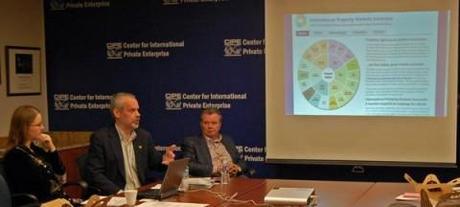
As we celebrate the Global Entrepreneurship Week, we are reminded time and again that making entrepreneurship work takes an entire ecosystem of supporting factors. CIPE’s recent report, “Creating the Environment for Entrepreneurial Success,” highlighted the complexities involved and focused on many elements needed for entrepreneurs to succeed. Property rights and institutions that create healthy property markets are among such crucial elements of building vibrant entrepreneurship ecosystems.
Property rights are key building blocks of modern market economies. They are also a fundamental human right, enshrined in Article 17 of the United Nations Universal Declaration of Human Rights, which states that:
- (1) Everyone has the right to own property alone as well as in association with others.
- (2) No one shall be arbitrarily deprived of his property.
These simple statements seem self-evident. Yet, it takes a multitude of intertwined and interacting laws, rules, and institutions to ensure that property rights are accessible to all members of the society and adequately protected so that they can become equal stakeholders in their country’s future.
The International Property Markets Scorecard, a tool jointly developed by the Center for International Private Enterprise (CIPE) and the International Real Property Foundation (IRPF), takes such a holistic view of property rights in their broader context. The Scorecard maps the institutional components of property markets and evaluates their effectiveness, providing a methodology to investigate the six core elements necessary for sustainable property market development:
- property rights laws and enforcement,
- access to credit,
- efficiency of governance,
- rational dispute resolution,
- financial transparency,
- appropriate regulations.
The Scorecard is a tool for in-country reformers, international policy advisors, and market analysts as it provides comprehensive snapshots of market conditions, identifying key areas for reform as well as market risks. CIPE and IRPF have been using this methodology to conduct research and support local partners’ advocacy efforts over the last few years in countries ranging from Armenia to the Philippines. Today we finally brought all the findings together under the newly launched International Property Markets Scorecard website, www.propertymarketsscorecard.com.
Former President of the International Real Estate Federation’s (FIABCI) Dutch chapter and European Vice President of FIABCI Gerard W. Bakker, and Principal Consultant of World Citizen Consulting and Secretary General of the International Real Estate Federation’s U.S. chapter (FIABCI-USA) William Endsley joined CIPE today at a launch event to discuss the Scorecard as a tool to reform property rights and markets. Bakker highlighted the relevance of the Scorecard to FIABCI’s work especially under the Global Housing Foundation, a joint FIABCI and UN initiative that seeks to house the homeless around the globe by combining private- and public-sector resources. Endsley added that the Scorecard is a useful and versatile system analysis tool that shows how different elements of property markets are interconnected, with improved property rights as the first step toward better functioning markets.
Accessible, secure property rights and entrepreneurship go hand in hand. Yet, as the Commission on Legal Empowerment of the Poor, co-chaired by Hernando de Soto and Madeleine Albright, put it:
“In too many countries, the laws, institutions, and policies governing economic, social, and political affairs deny a large part of society the chance to participate on equal terms.”
The International Property Markets Scorecard provides the tools and a road map to address these institutional shortcomings, to make property rights meaningful, and to create more conducive entrepreneurship ecosystems around the world.
Anna Nadgrodkiewicz is Director of Multiregional Programs at CIPE.

